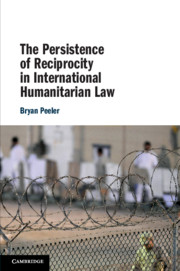Book contents
- The Persistence of Reciprocity in International Humanitarian Law
- The Persistence of Reciprocity in International Humanitarian Law
- Copyright page
- Dedication
- Contents
- Acknowledgements
- Table of Cases
- Abbreviations
- 1 Introduction
- 2 Reciprocity and IHL Compliance
- 3 Reciprocity and the Updating of the Geneva Conventions
- 4 The Expectation of Reciprocity and the War in Vietnam
- 5 The Expectation of Reciprocity and the GWOT
- 6 Conclusion
- Appendices
- Bibliography
- Index
5 - The Expectation of Reciprocity and the GWOT
Published online by Cambridge University Press: 03 October 2019
- The Persistence of Reciprocity in International Humanitarian Law
- The Persistence of Reciprocity in International Humanitarian Law
- Copyright page
- Dedication
- Contents
- Acknowledgements
- Table of Cases
- Abbreviations
- 1 Introduction
- 2 Reciprocity and IHL Compliance
- 3 Reciprocity and the Updating of the Geneva Conventions
- 4 The Expectation of Reciprocity and the War in Vietnam
- 5 The Expectation of Reciprocity and the GWOT
- 6 Conclusion
- Appendices
- Bibliography
- Index
Summary
This chapter argues that what appears to be a break in the US policy towards its GC III obligations is really a change in emphasis from positive reciprocity to negative reciprocity. The multi-actor setting of US policy decision making made such a change possible. The chapter begins by examining the period from the end of the Vietnam War through to the USA-led NATO bombing campaign against Yugoslavia. It demonstrates how a split emerged, one that had not existed previously, between US policy makers and the military in attitudes towards reciprocity and IHL obligations. It then analyzes three key decisions: (i) to use military commissions to try detainees for IHL violations, (ii) to deny POW status to detainees, and (iii) to use “enhanced interrogations techniques” when questioning detainees. It argues that logic of appropriateness explanations cannot fully explain US policy decisions towards the treatment of detainees in the GWOT. In each of the three policy decisions examined, concerns with specific negative reciprocity are necessary to understand fully the US decision not to apply GC III.
Keywords
- Type
- Chapter
- Information
- The Persistence of Reciprocity in International Humanitarian Law , pp. 128 - 168Publisher: Cambridge University PressPrint publication year: 2019

